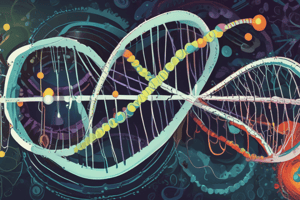Podcast
Questions and Answers
Which mechanism(s) does drug absorption occur through?
Which mechanism(s) does drug absorption occur through?
- None of the above
- Specialized transport mechanisms only
- Both passive diffusion and specialized transport mechanisms (correct)
- Passive diffusion only
What affects dissolution rate and solubility of a drug?
What affects dissolution rate and solubility of a drug?
- Crystal or amorphous drug form only
- Salt forms only
- Both particle size and crystal or amorphous drug form and salt forms (correct)
- Particle size only
What do bioavailability and bioequivalence describe?
What do bioavailability and bioequivalence describe?
- Both the rate and extent of drug absorption (correct)
- None of the above
- The extent of drug absorption only
- The rate of drug absorption only
What must generic drugs be compared to?
What must generic drugs be compared to?
Which of the following is NOT a route of drug administration?
Which of the following is NOT a route of drug administration?
What is drug metabolism or biotransformation?
What is drug metabolism or biotransformation?
How are drugs excreted from the body?
How are drugs excreted from the body?
What are some pharmacokinetic principles?
What are some pharmacokinetic principles?
How can dosage regimen considerations be approached?
How can dosage regimen considerations be approached?
Which of the following does NOT affect solubility and dissolution of a drug?
Which of the following does NOT affect solubility and dissolution of a drug?
Flashcards are hidden until you start studying
Study Notes
- Drug absorption occurs through passive diffusion or specialized transport mechanisms.
- Particle size affects dissolution rate and solubility.
- Crystal or amorphous drug form and salt forms affect solubility and dissolution.
- Bioavailability and bioequivalence describe the rate and extent of drug absorption.
- Generic drugs must be bioequivalent to their brand-name counterparts.
- Different routes of drug administration include oral, rectal, parenteral, epicutaneous, ocular, otic, nasal, and others.
- Drug metabolism or biotransformation involves chemical changes to drugs within the body.
- Excretion of drugs occurs through various bodily fluids.
- Pharmacokinetic principles include half-life, clearance, and dosage regimen considerations.
- Dosage regimen considerations can be approached empirically or kinetically.
Studying That Suits You
Use AI to generate personalized quizzes and flashcards to suit your learning preferences.




